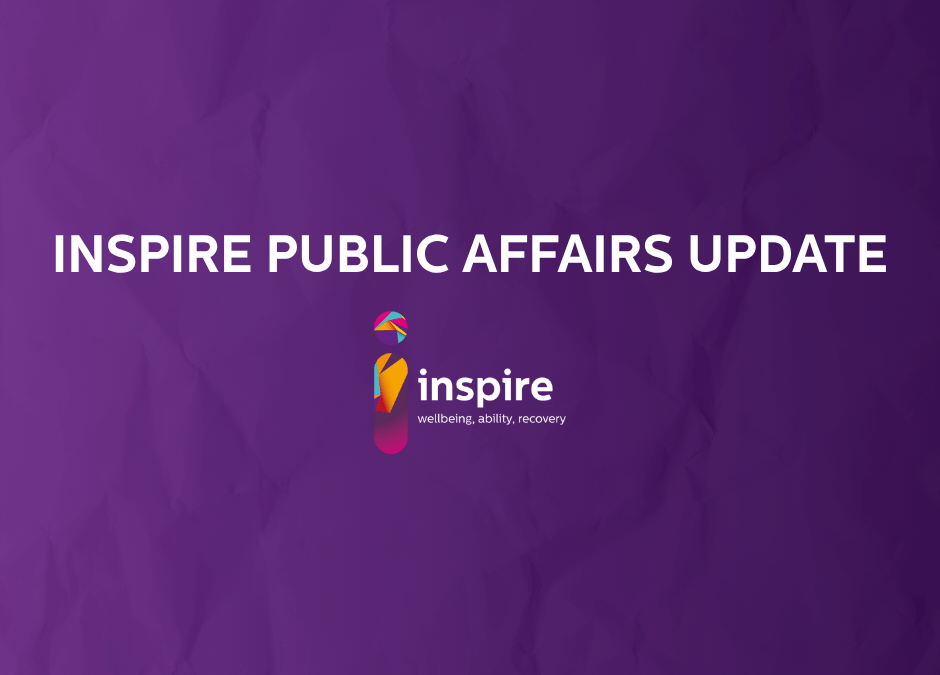Week Commencing – 24/11/2025
Inspire’s public affairs update is your source for the latest Northern Ireland Assembly discussions relevant to mental health, addiction, intellectual disability and autism.
Our aim is to inform the public, our colleagues and the people who use Inspire services about pertinent issues in the political space, issues that should always be informed by the voice of lived experience.

On 17th November, MLAs debated a motion relating to the cost of living.
- Colm Gildernew MLA opened the debate, pointing out that many people will face anxiety and hardship during the festive season.
- He cited Trussell Trust research showing that food insecurity impacts 21% of households in Northern Ireland, as well as the high levels of poverty – relative and absolute – in the region.
- He criticised the UK Government’s ongoing austerity agenda, calling for an end to the two-child limit, and described the Northern Ireland Executive’s draft Anti-Poverty Strategy as too vague: “The absence of targets and outcomes renders the strategy largely meaningless.”
- He also stressed the need for an Executive-level fuel poverty strategy.
- Andy Allen MLA spoke about the threat of food insecurity and rising costs. He stated that school meals are often the most reliable and nutritious meal for children and that rising costs risk worsening hunger, behaviour and learning outcomes.
- He appealed to the Minister of Education to review price increases and the eligibility threshold for free school meals.
- Maurice Bradley MLA signalled the DUP’s support for the motion. He pointed out that voluntary and community sector plays a vital role in supporting vulnerable households where government cannot. The DUP, he said, proposes an approach focusing on: helping people into sustainable employment, maintaining a strong safety net (including welfare mitigations) and enacting a coordinated, Executive-wide approach.
- Sian Mulholland MLA said that “The anti-poverty strategy consultation may be over, but poverty is not pausing. Poverty is tightening its grip on such a wide swathe of households, but it is the depth of poverty that should trouble every one of us…”
- She referenced Joseph Rowntree Foundation research that indicates a deepening poverty crisis throughout the UK and echoed the calls for the inclusion of targets and indicators in the final iteration of the Anti-Poverty Strategy.
- According to Mark H. Durkan MLA, “The cost-of-living crisis is a term that has slipped from our daily lexicon not because it has gone away but because people have become so accustomed to hardship that it no longer shocks in the way that it did and still should… Today, food banks are no longer a rarity but a staple in all our town centres.”
- He described the voluntary and community sector as “an absolute lifeline” and poverty as “a political choice”.
- The Minister for Communities, Gordon Lyons, also participated in the debate. Politics, he suggested, should be about improving lives and uplifting communities. “I am not here to make empty promises. I want to make promises that I can deliver on,” he said.
- He confirmed that the final Anti-Poverty Strategy will include measurable targets and outcomes but that economic growth is, in his view, a fundamental part of alleviating poverty: “We need to make sure that we have a strong and growing economy that provides well-paid jobs… we need to make sure that jobs are available to people and that there is a safety net if people cannot work. Working is the game changer.”
- At the conclusion of the remarks, MLAs adopted the following resolution:
That this Assembly notes that, according to data published by the Office for National Statistics (ONS) on 22 October 2025, the inflation rate is at 3·8%, which is higher than the EU average; further notes that that rate of inflation is nearly double the Bank of England’s 2% target; is deeply concerned about the persistent rise in the cost of living and the impact that it is having on workers, families and communities; commends the Executive on their firm refusal to impose unfair taxes and charges on already struggling workers and families; recognises that many will face increased financial pressure in the weeks leading up to Christmas and throughout the winter; further recognises the vital work that is being carried out by voluntary and community sector organisations in supporting vulnerable groups who are disproportionately affected by the rise in the cost of living; acknowledges the ongoing concerns expressed by the sector with regards to the shortcomings of the draft anti-poverty strategy published by the Minister for Communities; notes with concern that food prices have risen sharply in recent years, contributing to increasing levels of food insecurity and worsening health inequalities across Northern Ireland; further notes the recent announcement by the Education Authority regarding the increase to the cost of school meals, which will add further pressure on already stretched household budgets; recognises that affordable access to food, including school meals, is vital in tackling child poverty and reducing health inequalities; believes that departmental and arm’s-length body decisions must align with the objectives of the Executive’s anti-poverty strategy; calls on the Minister of Education to review the Education Authority’s decision, to increase the eligibility threshold for free school meals, and to work with the Minister for Communities to ensure a coordinated approach to supporting low-income families; and further calls on the Minister for Communities to strengthen the draft anti-poverty strategy to include measurable poverty reduction targets and clear actions to address food and fuel poverty.
On 18th November, MLAs discussed the future of the Birch Hill Mental Centre for Mental Health in Antrim.
- Declan Kearney MLA opened the debate, stating that the proposed centre is urgently needed to replace the outdated facilities at Holywell Hospital.
- He asked the Minister of Health, Mike Nesbitt, to do two things: expedite approval of the required funding and confirm a clear time frame on construction.
- Trevor Clarke MLA echoed these sentiments, telling the Minister that he could not afford to delay the building work any longer.
- John Blair MLA said: “The proposed Birch Hill centre will… enable access to quality care for those who are struggling. For many residents in South Antrim and beyond, having the centre will mean receiving the support that they need, and need now, closer to home and in an environment that is designed for recovery… As a society, we must treat mental health and mental health problems with the same urgency and importance as physical health. The cost of inaction is profound…”
- Alan Chambers MLA flagged the high costs of the project and the requirement for Executive-wide approval for an outlay of such scale. He emphasised the importance of the Department of Finance’s upcoming budget.
- The Minister praised the plans for Birch Hill, along with the project’s holistic, recovery-oriented ethos. “It is a model that will continue to be developed and embedded throughout the existing wards, ensuring that a patient’s admission is appropriate, purposeful, therapeutic and safe,” he said.
- He went on to point out, however, that his department is dealing with straitened finances and that there are a number of partially committed capital schemes. As such, no funding commitments are currently possible: “I need the money. I do not have the money.”
“… people have become so accustomed to hardship that it no longer shocks in the way that it did and still should… Today, food banks are no longer a rarity but a staple in all our town centres.”

On 20th November, the Northern Ireland Assembly’s Committee for Health received a briefing from the Minister of Health, Mike Nesbitt.
- The Minister updated MLAs on his department’s ‘Shift Left’ agenda, an approach that focuses on maximising health outcomes through continuity of care, prevention measures and community-based (rather than hospital-based) services.
- He said that this is the kind of change necessary to avoid a future collapse of the health system.
- He described the agenda’s neighbourhood model as “the way to go” but that added that it hinges on buy-in from general practitioners.
- He acknowledged that ‘Shift Left’ could only be realised with adequate funding but reminded MLAs that, if properly deployed, it would, by its very nature, free up money and resources.
FACT OF THE WEEK
“Northern Ireland has around 220,000 unpaid carers, who provide support that saves the Executive an estimated £5.8 billion per year, yet they are among the groups most affected by rising costs.”
Andy Allen MLA – 17.11.25

17th November 2025 – All-Party Group on Suicide Prevention
- The All-Party Group (APG) on Suicide Prevention met to hear about the work of PIPS Hope and Support, a community-led charity dedicated to suicide prevention, crisis intervention and bereavement support. The Samaritians also briefed attendees.
- APG chair Órlaithí Flynn MLA opened the meeting and invited PIPS CEO Seamus McCabe to present to the group.
- He talked about the WELL-bean Café, a café in Newry that is dedicated to supporting individuals experiencing mental or emotional distress.
- Professor Siobhán O’Neill, the Mental Health Champion for Northern Ireland, commented on the success of the WELL-Bean Café model. She said that these types of localised initiatives are an important complement to the mooted regional mental health crisis service and noted the urgency of delivering at service.
- Samaritans Executive Director Sarah O’Toole and Wesley Wilson, who volunteers with organisation, provided an informative overview of the support that they provide throughout Northern Ireland. In 2024, the Samaritans helpline received 100,00 contacts, with an average call time of 21 minutes.
- Outlining their work in prisons, they said “people in prison are significantly more likely to die by suicide than people in the general population.”
- Órlaithí Flynn signalled the APG’s intention to launch an inquiry into cross-departmental funding for suicide prevention in early 2026. The aim of this inquiry is to showcase community-led initiatives, demonstrating that publicly funded local projects – such as the WELL-Bean Café – can reduces the strain on core services.
18th November 2025 – All-Party Group on the Voluntary and Community Sector
- APG chair Diane Forsythe MLA welcomed a large turnout for the launch of the Voluntary and Community Sector-led Approaches to Economic Inactivity report from Pivotal Public Policy Forum, which provides a major evidence base for the #NICantWait campaign.
- NICVA’s Director of Policy and Insight, Jonny Currie, provided a short briefing on key policy and current campaign initiatives. He laid out the ways in which NICVA is working alongside sector organisations, as well as government, and referenced his recent attendance at the Committee for Communities, where he discussed the Partnership Agreement between Government and the Voluntary and Community Sector in Northern Ireland.
- Dr James Greer, Senior Researcher at Pivotal, welcomed the opportunity to highlight the think tank’s findings. He said that the report demonstrates the unique value and social impact of the sector in delivering programmes aimed at recruiting cohorts of economically inactive people.
- In addition to the chair, Sian Mullholland MLA and Brian Kingston MLA endorsed the report and committed to sharing its messages with key decision makers across government.

Week commencing 24th November 2025
Ministerial oral questions: Health – 24th November
Assembly motion: Executive Budget – 25th November
Committee for Communities: briefing on Anti-Poverty Strategy Consultation – 27th November
Committee for Health: briefing on services in Western Health and Social Care Trust – 27th November
Written by:

Kyle Duncan
Engagement and Public Affairs Manager

Matthew Coyle
Policy and Campaigns Officer
